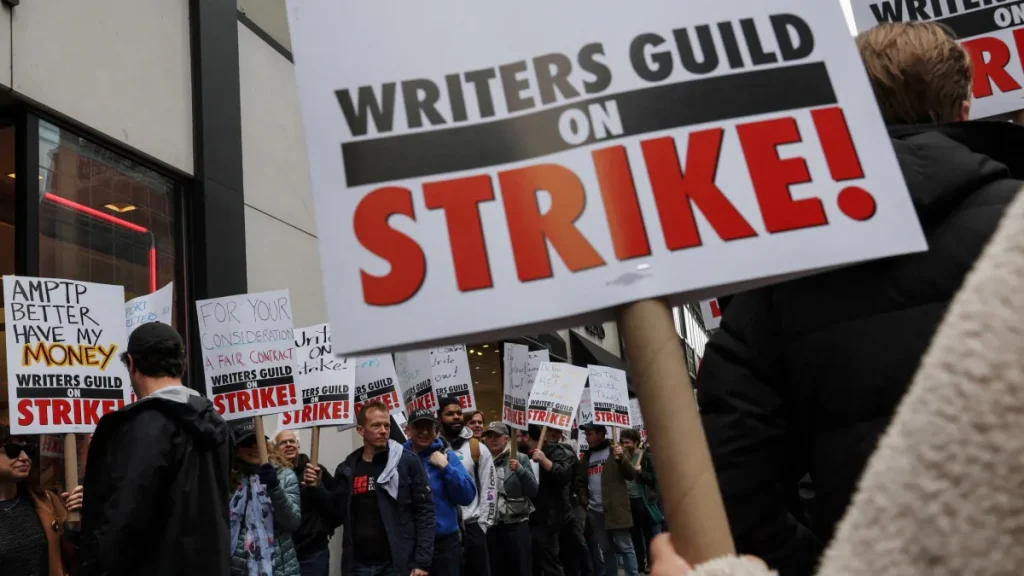Negotiations between the Writers Guild of America and an alliance of entertainment companies broke down, leading to the strike.
The film and TV writers’ strike, which began Tuesday, could be just the start of a long summer of labour troubles in Hollywood.
Negotiations between the Writers Guild of America and the Alliance of Motion Picture & Television Producers, a trade association that represents entertainment companies such as Walt Disney and Warner Bros. Discovery, broke down Monday night.
But other entertainment-industry negotiations are right around the corner, increasing the likelihood of production delays and adding to pressure on TV and film studios to work out labour agreements.
Separate unions representing actors, SAG-Aftra, and directors, the Directors Guild of America, are expected to begin negotiating new contracts for their members with the same motion picture alliance in the coming weeks. Like the writers, the directors and actors are putting compensation for creators in the streaming-video era at the centre of their talks.
The studios are considering negotiating agreements with those other unions before returning to the writers, believing the actors and directors will be easier to deal with, according to a person familiar with the studio alliance’s thinking. That strategy could push any resolution of Hollywood’s labour woes into August, however, said the person, who asked not to be identified because the deliberations are private.
Writers for some of the most popular shows on television began walking picket lines Tuesday afternoon, seeking higher pay and saying they’ve been shortchanged by the shift to streaming as the dominant source of entertainment viewing. Hundreds turned out in front of one of Netflix’s offices in Los Angeles, some carrying signs and chanting, “Hey ho, hey ho, corporate greed has got to go.” One sign read: “Don’t you want to know how The Last of Us ends?”
The most immediate casualty of the strike has been the evening comedy shows. NBC’s The Tonight Show Starring Jimmy Fallon and Late Night With Seth Meyers have stopped producing new programs, with the network planning to air reruns in their place. Fans also won’t get to see new episodes of Real Time with Bill Maher and John Oliver’s Last Week Tonight, which air on Warner Bros.’ HBO.
The writers say their pay has fallen over the last decade, with members buffeted by changes in the business, including shorter seasons for shows on streaming services. The guild is seeking at least a 5 percent increase in basic pay, commitments for at least 13 weeks of work, and a minimum of six writers per show.
They also want additional compensation for programs on streaming services that turn out to be hits, something they say the studios rejected. The studios said their proposal for increased minimums and payments for streaming residual earnings has been “generous.”
TV viewers have migrated to streaming services and are watching fewer regularly scheduled shows on broadcast and cable. In a sign of how rapidly the TV business is changing, Fox on Monday cancelled 9-1-1, one of its most-watched programs, because of the cost to produce the show. Disney, which owns the program, will run a seventh season on its ABC network instead.
The previous writers’ strike, in 2007, lasted 100 days and cost the Los Angeles economy an estimated $2.5 billion (roughly Rs. 20,500 crore) in lost output. This strike, which is national in scope, could crimp the economies of states such as New York and Georgia, which are also hubs for film and TV production.
In recent days agents scrambled to sign last-minute deals with writers before they were forbidden from doing so. Lawyers working on entertainment-related acquisitions were asked by clients to include financial accommodations in the event of an extended strike.
Other Hollywood unions are taking a cautious approach to the writers’ strike so far. SAG-Aftra, which represents over 160,000 actors, said that while it supports the writers, it won’t be joining them in a work stoppage. The union, which has its own contract with the studios, said actors should still show up on set. They’re allowed to walk picket lines with writers in solidarity, but only when they’re not supposed to be working.
The actors begin negotiating on June 7, for a new contract to replace one that expires at the end of that month. The Directors Guild said it will begin its negotiations with the studios on May 10. Among other issues, the directors want greater payments from streaming services with subscribers globally.

